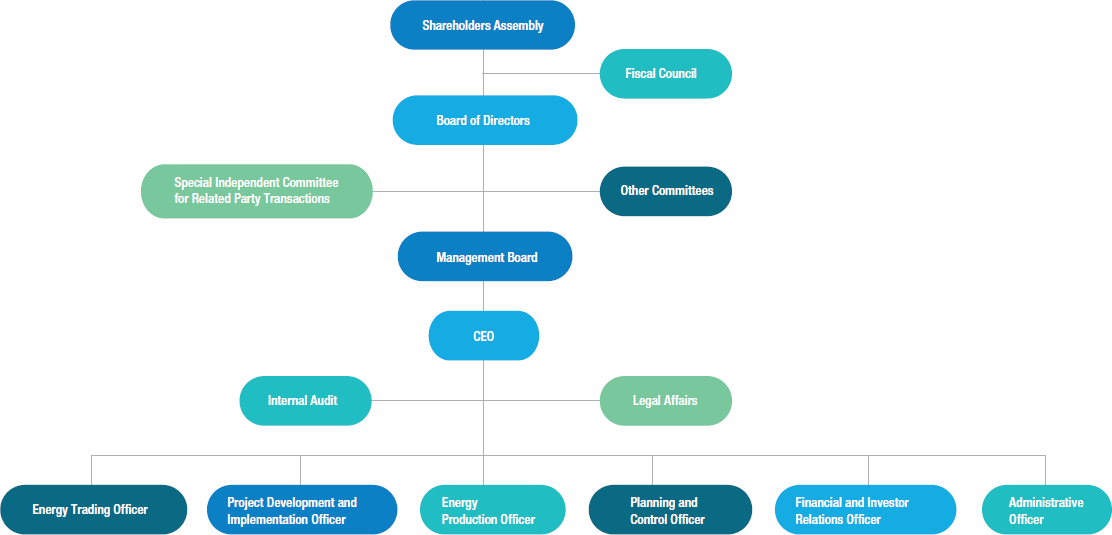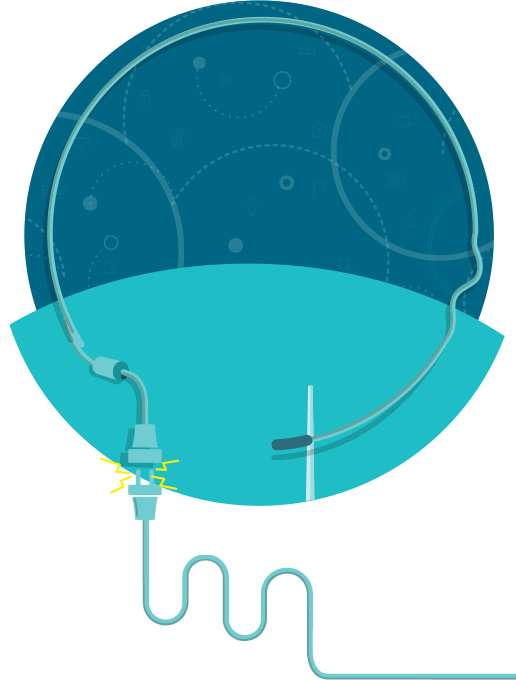Management Structure
GRI G4-34The highest level in the Company’s management hierarchy is the General Shareholders’ Meeting, and below this, the Board of Directors and the Management Board.
Management Organization Chart (as at 12/31/2015)

Board of Directors
The Corporate Bylaws and the Board of Directors’ Internal Charter – available from the Company’s website – establish the functions of the Directors and Executive Officers as well as the rules for the delegation of authority. Among the principal functions of the Board of Directors, are to:
- Establish the Company’s mission, vision, values, policies and goals;
- Decide the strategic business objectives and ensure implementation of organizational structures and procedures in order to achieve these objectives;
- Ensure that clarifications are provided to shareholders; and
- Elect and remove the executive officers and establish their duties as well as supervise the management of these executives.
The Company’s Bylaws establish that the Board of Directors must consist of no less than five and no more than nine effective members and an equal number of alternates, all elected at a General Shareholders´ Meeting (GSM) for two-year terms of office. Members are eligible for reelection. One member and his alternate represent the employees, elected by the direct vote of the employees and approved at a GSM. At least 20% of the board members must be independent, as required by Novo Mercado Listing Regulations. The Chairman of the Board does not hold an executive position in the Company. Self-evaluation by board members is undertaken annually and the result registered in publicly disclosed minutes.
| Full members | Alternates |
|---|---|
| Maurício Stolle Bähr – Chairman | Patrick Charles Clement Obyn |
| Philip Julien De Cnudde – Vice Chairman | Pierre Victor Marie Nicolas Devillers |
| Antonio Alberto Gouvêa Vieira – Minority shareholders’ representative | Luiz Leonardo Cantidiano Varnieri Ribeiro – Minority shareholders’ representative |
| Dirk Achiel Marc Beeuwsaert | Gil de Methodio Maranhão Neto |
| Luiz Eduardo Simões Viana | * |
| José Pais Rangel – Minority shareholders’ representative | José João Abdalla Filho – Minority shareholders’ representative |
| Manoel Arlindo Zaroni Torres | André de Aquino Fontenelle Canguçu |
| Roberto Henrique Tejada Vencato – Employee representative | Luiz Antônio Barbosa – Employee representative |
| Willem Frans Alfons Van Twembeke | José Carlos Cauduro Minuzzo |
|
*Position temporarily vacant due to the resignation of one of the members – temporarily substituted by the then alternate, no new appointment having since been made. |
|
Fiscal Council
Tractebel Energia’s Fiscal Council has been permanently installed since 2013. It has the duties of analyzing the Company’s Financial Statements, supervising the activities of the Management Board and the evaluation of risk management systems and the internal controls. In the event that additional services are agreed with the independent audit company which audits the Financial Statements, it is also incumbent on the Fiscal Council to evaluate the proposals to be submitted to the Board of Directors.
The Fiscal Council comprises from three to five effective members and an equal number of alternates, elected by the General Shareholders´ Meeting for a term of office of one year, members being eligible for reelection.
| Full members | Alternates |
|---|---|
| Manoel Eduardo Lima Lopes | Ailton Pinto Siqueira |
| Carlos Guerreiro Pinto | Manuel Eduardo Bouzan de Almeida |
| Paulo de Resende Salgado | Flávio Marques Lisboa Campos |

Committees
Tractebel Energia has nine committees to assist Management in taking decisions on specific matters. The committees have a consultative function and are as follows:
- Strategic Committee | Handles such matters as the selection and monitoring of expansion projects for the generator complex and the monitoring of trends in the electricity industry. It is common for Tractebel Energia’s officers as well as outside guests to be invited to speak on pre-selected matters on the Committee’s agenda.
- Human Performance Committee | The aim of this body is to ensure the implementation of the fundamentals of human performance in order to minimize lapses or human error at the plants operated by Tractebel Energia and its subsidiaries.
- Financial Committee | Submits policies to the Management Board for investments, prepayments and anticipation or postponement of receivables. It is also incumbent on this committee to select the financial institutions with which the Company has an interest in working and to identify asset-liability mismatches, proposing hedging operations where necessary.
- Energy Committee | Proposes Tractebel Energia’s commercialization guidelines – including participation in auctions –, purchase and sale prices, quantitative limits for energy contracts eligible to comprise the Company portfolio, this in turn involving the monitoring of the electric power market.
- Risk Management Committee | Identifies and classifies events that result in risks to the businesses, according to their probability and significance, and defines the respective control procedures. The Committee is responsible for raising the awareness in the handling of corporate risk and defining goals and guidelines for risk management.
- Innovation Committee | Stimulates the development of ideas that add value to the Company. It receives and evaluates proposals, recommending to the Management Board allocation of funds for selected initiatives as well as actions for recognizing the proponents of such proposals. In addition, the Committee collaborates so that the Company participates in contests focused on innovation and promoted by the ENGIE Group.
- Tax Planning Committee | In the light of the tax legislation, decides which cases and under what circumstances Tractebel Energia should challenge administrative and judicial rulings. Also presents suggestions, which can generate tax credits, including those arising from new projects taking into account opportunities for reducing the tax take.
- Sustainability Committee | Contributes to consolidating sustainability as part of the Company’s corporate culture, proposing goals and actions in sustainable development to the Management Board, adopting the necessary coordination with the organizational units in order to execute the same. Stimulates initiatives and evaluates requests for support of actions benefiting communities in regions surrounding the head office and plants – whether already in operation or under construction. In addition, the Committee promotes education in sustainability for internal and external stakeholder audiences. The employee representative with a seat on the Board of Directors is one of the committee members.
- Special Independent Committee for Transactions with Related Parties | With a view to fine tuning corporate governance practices, Tractebel Energia and its parent company ENGIE, took the decision to set up an independent committee for assessing transactions with related parties. The committee is installed by the Board of Directors whenever the Company intends to negotiate any transaction with related parties. It is the Committee’s responsibility to negotiate and recommend or otherwise, the execution of these transactions, thus making the process more transparent and secure. The Committee comprises from three to five members, the majority of which, representatives of the minority shareholders with seats on the Board of Directors.

Management Board
As enshrined in the Corporate Bylaws, the Chief Executive Officer’s responsibilities are to chair the meetings of the Management Board, coordinate and guide the activities of the other executive officers, to allocate special activities and tasks for executing the resolutions of the Board of Directors and the Management Board.
The Chief Executive Officer and the remaining executive officers are nominated by the Board of Directors and elected by the GSM. The Management Board works on a collegiate basis, the approach to matters on the agenda being a matricial one, albeit respecting the specific functions of each board member.
| Name | Position |
|---|---|
| Manoel Arlindo Zaroni Torres | Chief Executive Officer |
| José Carlos Cauduro Minuzzo | Energy Production Officer |
| Marco Antônio Amaral Sureck | Energy Commercialization Officer |
| José Luiz Jansson Laydner | Projects Development and Implementation Officer |
| Eduardo Antonio Gori Sattamini | Finance and Investor Relations Officer |
| Edson Luiz da Silva | Planning and Control Officer |
| Júlio César Lunardi | Administrative Officer |











